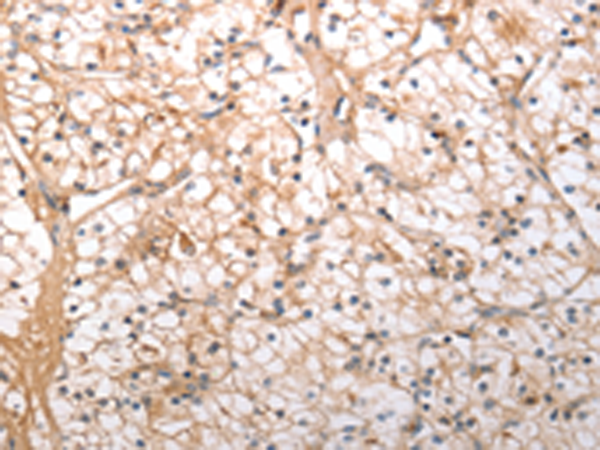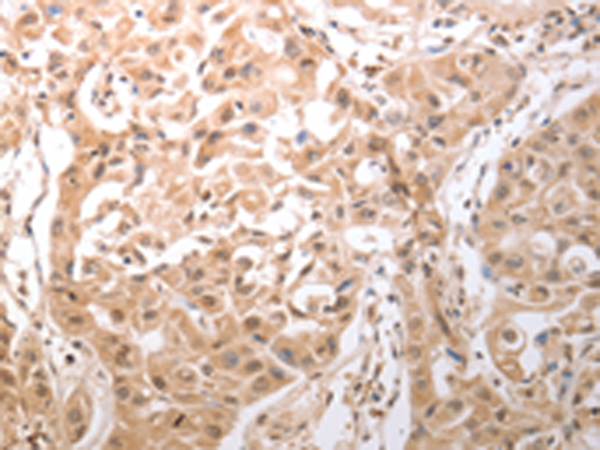

| WB | 咨询技术 | Human,Mouse,Rat |
| IF | 咨询技术 | Human,Mouse,Rat |
| IHC | 1/100-1/300 | Human,Mouse,Rat |
| ICC | 技术咨询 | Human,Mouse,Rat |
| FCM | 咨询技术 | Human,Mouse,Rat |
| Elisa | 1/2000-1/10000 | Human,Mouse,Rat |
| Aliases | OX1R |
| Host/Isotype | Rabbit IgG |
| Antibody Type | Primary antibody |
| Storage | Store at 4°C short term. Aliquot and store at -20°C long term. Avoid freeze/thaw cycles. |
| Species Reactivity | Human, Mouse, Rat |
| Immunogen | Synthetic peptide of human HCRTR1 |
| Formulation | Purified antibody in PBS with 0.05% sodium azide and 50% glycerol. |
+ +
以下是关于HCRTR1抗体的3篇参考文献,按文献名称、作者和摘要内容概括整理:
---
1. **文献名称**:*Selective Immunoneutralization of the Orexin-1 Receptor Prevents Dopamine-Mediated Relapse to Drug Seeking*
**作者**:Smith, R.J. et al.
**摘要**:该研究利用HCRTR1特异性抗体阻断大鼠模型中orexin-1受体(HCRTR1)的功能,证明其能显著抑制可卡因诱导的药物渴求复发。结果表明,HCRTR1抗体通过调节多巴胺能系统影响成瘾行为。
2. **文献名称**:*Characterization of a Novel Antibody for the Hypocretin Receptor 1: Application to Brain Tissue Staining*
**作者**:Blouin, A.M. et al.
**摘要**:研究开发了一种高特异性HCRTR1抗体,并通过免疫组化验证其在啮齿类及人类脑组织中的表达定位。抗体成功应用于下丘脑区域的受体可视化,证实了HCRTR1在调节睡眠-觉醒周期中的分布特征。
3. **文献名称**:*Orexin Receptor 1 (OX1R) Antibodies in Narcolepsy: Diagnostic Utility and Functional Insights*
**作者**:Mieda, M. et al.
**摘要**:本文评估了HCRTR1抗体在发作性睡病患者脑脊液中的诊断潜力,并发现其可通过阻断受体活性影响orexin信号通路。研究支持HCRTR1抗体作为潜在生物标志物用于睡眠障碍的机制研究。
---
这些文献聚焦于HCRTR1抗体的应用场景(如成瘾机制、脑成像、疾病诊断)及功能验证。如需更多细节,可进一步检索PubMed或Sci-Hub获取原文。
The hypocretin receptor 1 (HCRTR1), also known as orexin receptor type 1. is a G protein-coupled receptor primarily expressed in the brain, particularly in regions regulating arousal, reward, and stress responses. It binds to hypocretin neuropeptides (orexin-A and orexin-B), which are produced in the lateral hypothalamus and play critical roles in maintaining wakefulness, appetite, and energy homeostasis. HCRTR1 antibodies are tools developed to detect, quantify, or modulate this receptor in research and clinical contexts.
These antibodies are widely used in immunohistochemistry, Western blotting, and flow cytometry to study receptor localization, expression levels, and signaling pathways. Dysregulation of HCRTR1 is implicated in disorders such as narcolepsy (linked to hypocretin deficiency), insomnia, and addiction. Antibodies targeting HCRTR1 have also been explored for therapeutic applications, including blocking receptor activity in sleep disorders or modulating feeding behaviors.
Research using HCRTR1 antibodies has advanced understanding of its role in circadian rhythms and metabolic processes. For example, HCRTR1 antagonists like suvorexant, derived from antibody-guided structural studies, are approved for insomnia treatment. However, challenges remain in ensuring antibody specificity due to structural similarities with HCRTR2. Ongoing studies focus on refining antibody design to improve diagnostic accuracy and therapeutic potential in neuropsychiatric and metabolic diseases.
×